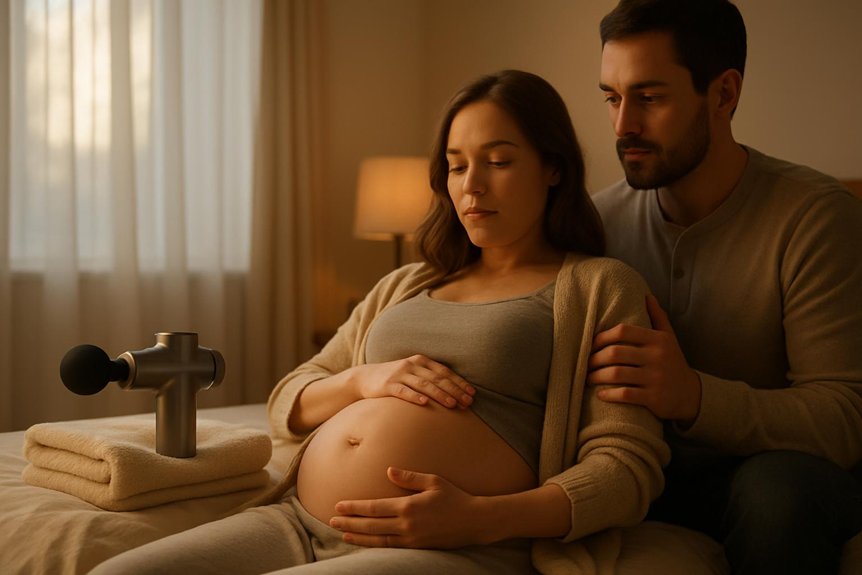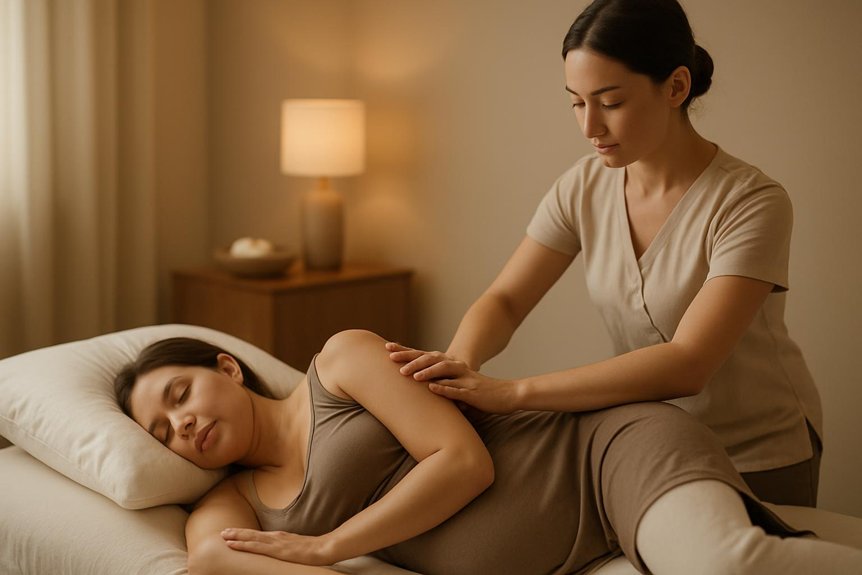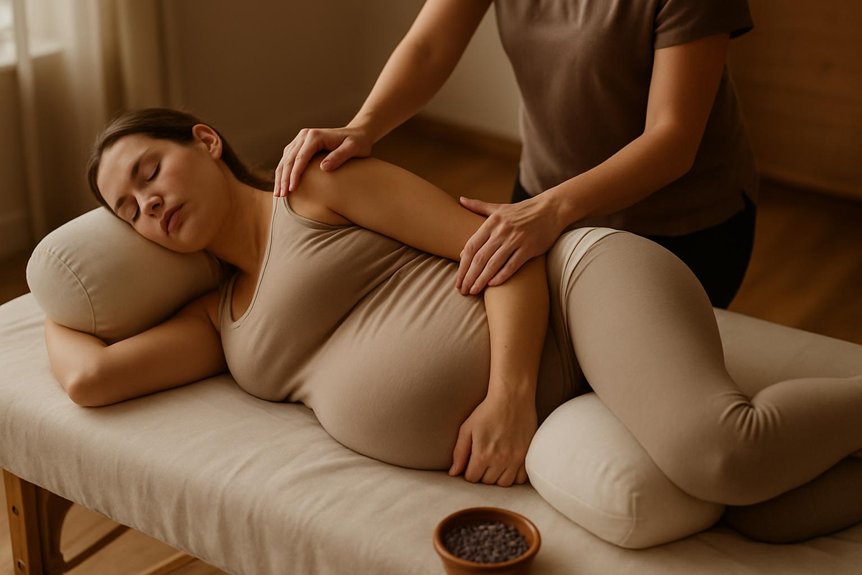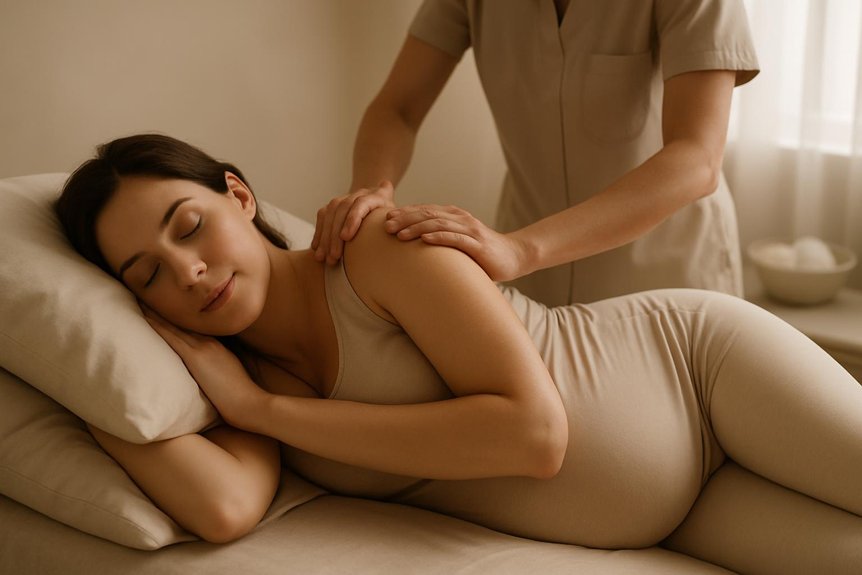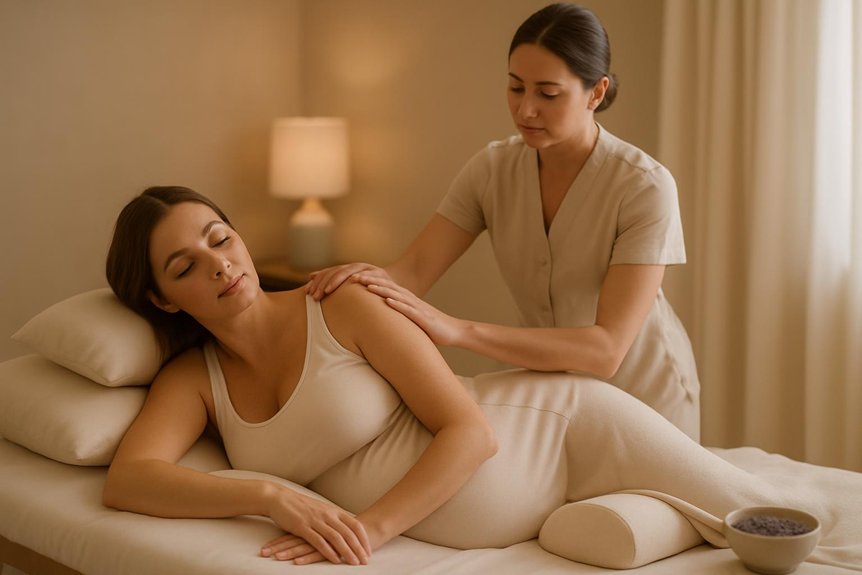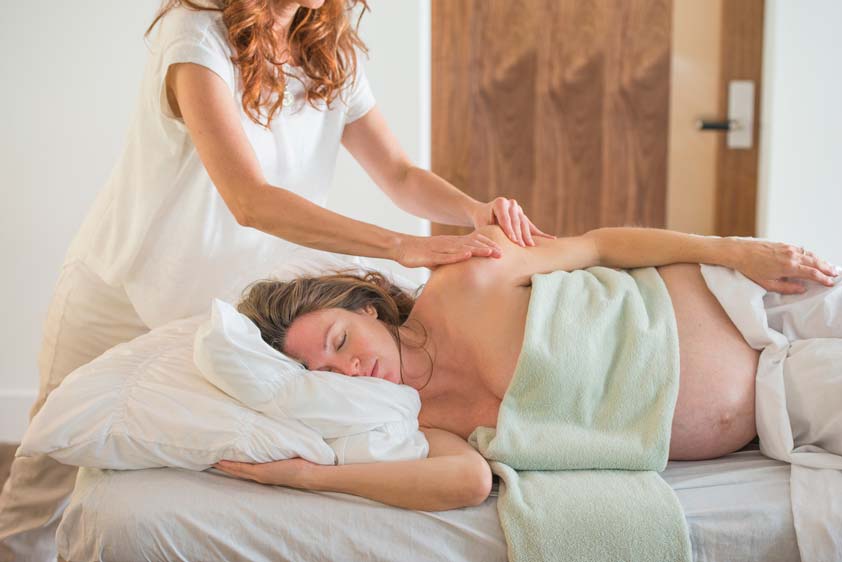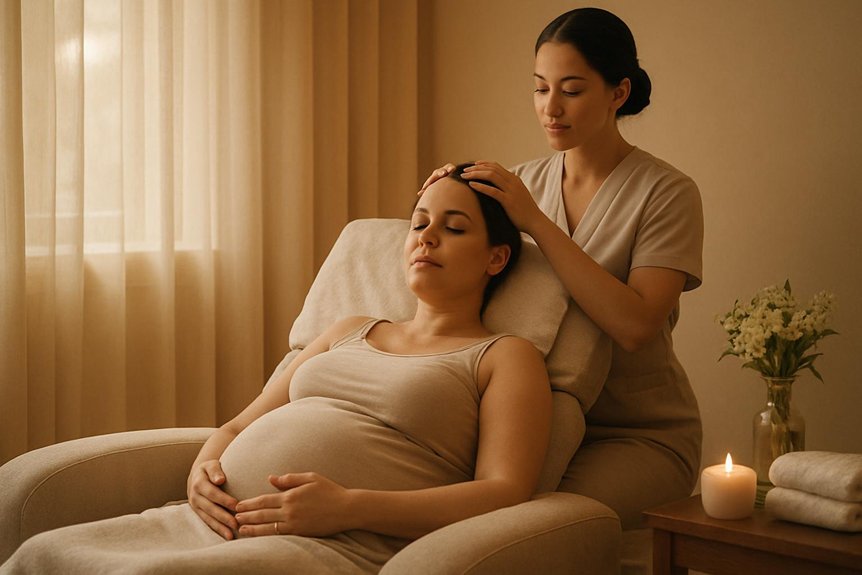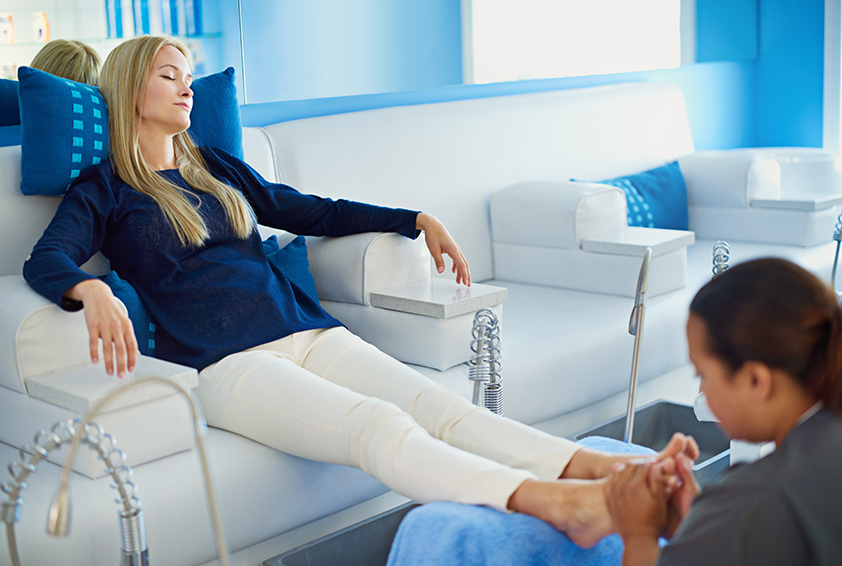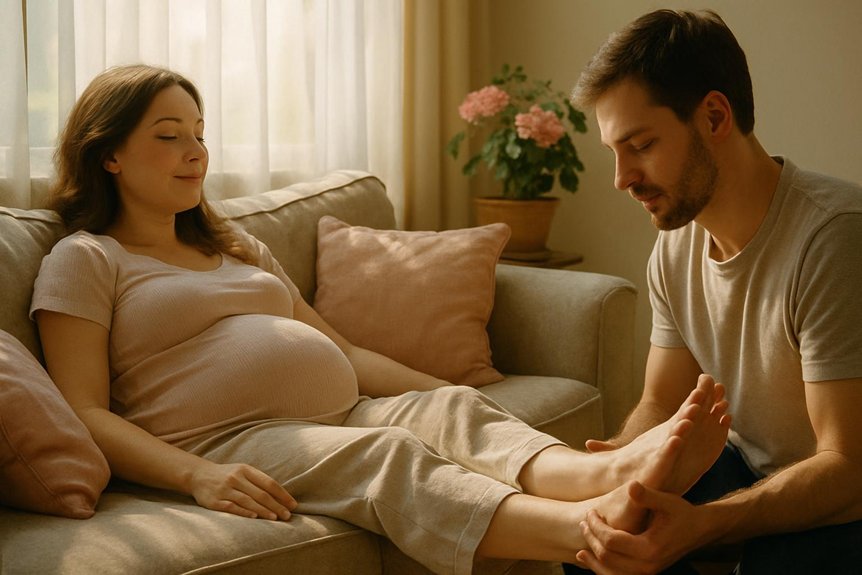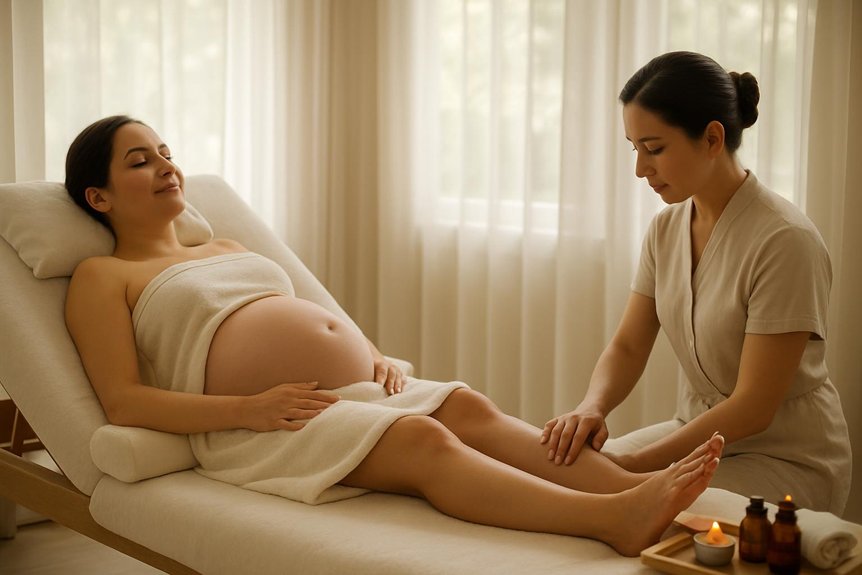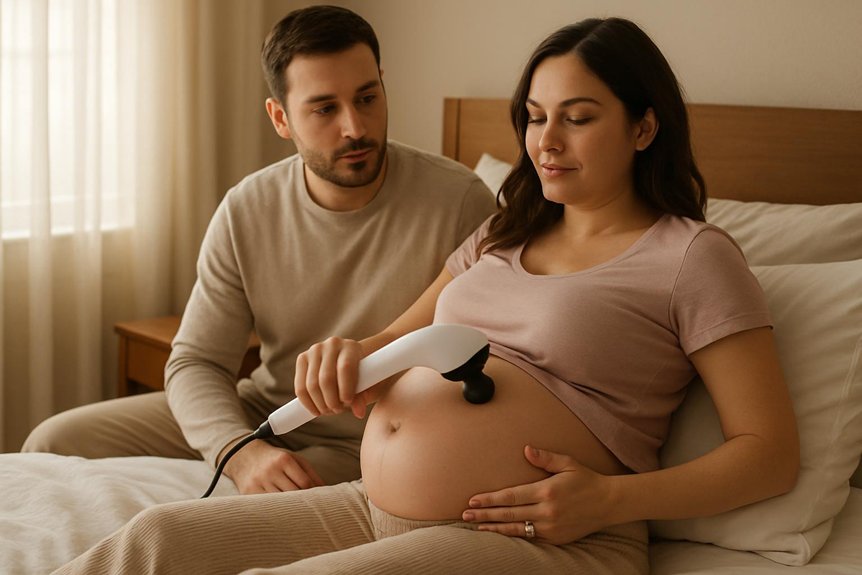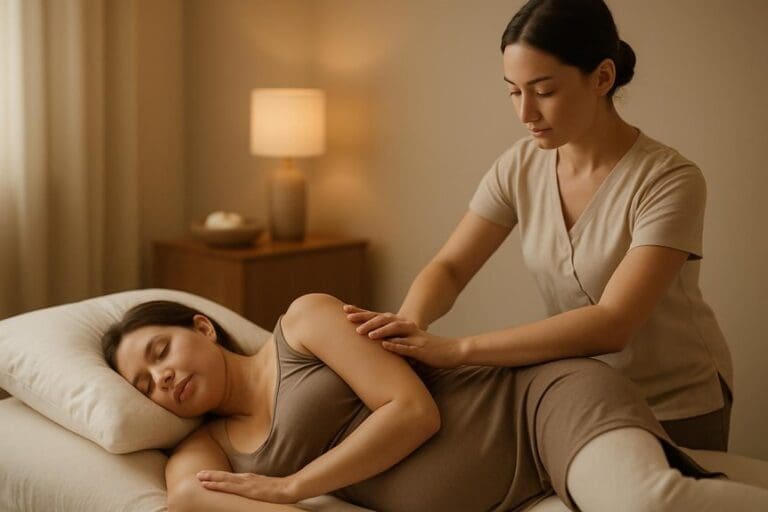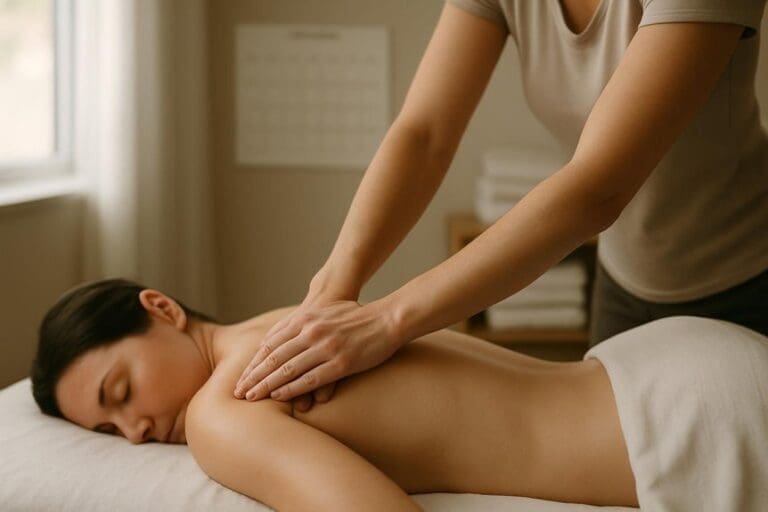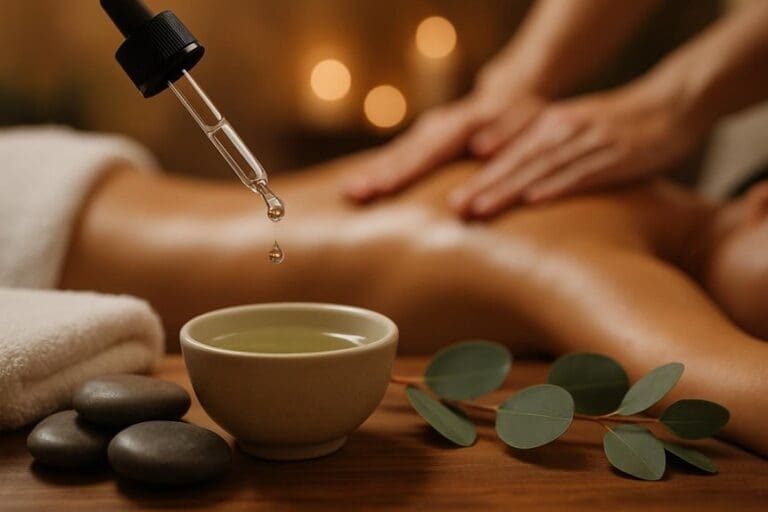Massage guns are generally not recommended during pregnancy due to potential risks such as increased tissue sensitivity, heightened risk of bruising, and the possibility of triggering contractions if used near the abdomen, lower back, or pelvis. The strong, mechanical stimulation can affect sensitive areas and is best avoided without professional guidance. Safer methods for relieving pregnancy discomfort exist and should be chosen with care. Further information outlines alternatives, targeted relief strategies, and professional recommendations for expectant mothers.
Understanding Massage Guns and How They Work
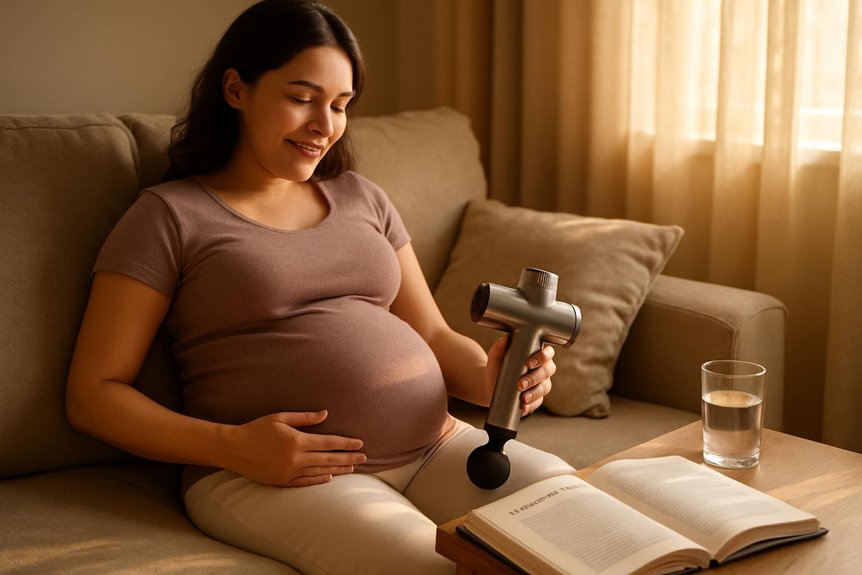
Although massage guns have gained popularity as convenient tools for self-massage, it is important to understand their mechanism of action. Massage guns operate by delivering rapid, targeted pulses to muscle tissue, a technique known as percussive or vibration therapy. These pulses aim to increase blood flow, reduce muscle tension, and promote relaxation.
At Spa & Massage, therapists emphasise the importance of understanding how such devices impact soft tissues. Unlike manual massage, which allows for nuanced adjustments based on feedback from the body, massage guns provide mechanical stimulation with fixed force and frequency. This can deliver effective relief when used appropriately, but it may not replicate the personalised care and adaptability found in professional, hands-on treatments.
Informed use guarantees safety and ideal therapeutic benefit. Aromatherapy massage is another relaxation method that offers unique benefits by combining essential oils with manual techniques to promote both physical and emotional healing.
Common Pregnancy Aches and Safe Relief Options
Pregnant individuals commonly experience discomforts such as lower back pain, swollen legs, and tension in the shoulders or hips.
Evidence-based relief options include gentle at-home remedies, such as appropriate stretching and the use of approved pillows, alongside professional therapies like pregnancy massage.
At Spa & Massage, therapists are trained to offer safe, tailored treatments designed to reduce these symptoms and support overall well-being during pregnancy.
Typical Pregnancy Discomforts
A wide range of physical discomforts often accompany pregnancy, including lower back pain, joint aches, muscle tension, swelling, and disrupted sleep. These symptoms arise as the body adapts to hormonal changes and the growing demands of the developing baby.
Lower back and pelvic pain are particularly prevalent, often due to shifts in posture and increased ligament laxity. Many expectant individuals also report leg cramps, headaches, and general fatigue, which can intensify as pregnancy progresses.
Understanding these discomforts is vital for seeking appropriate support. At Spa & Massage, therapists recognise the importance of gentle, evidence-based approaches to relieve common pregnancy aches, always prioritising both safety and comfort.
Personalised assessment ensures each client receives care tailored to their unique needs, supporting well-being throughout pregnancy.
Safe At-Home Remedies
Finding safe and effective ways to manage common pregnancy aches at home is essential for supporting maternal comfort and well-being. Gentle stretching, prenatal yoga, and warm (not hot) baths are widely recommended to ease muscular tension and promote relaxation.
Simple self-massage using light circular motions can help alleviate mild discomfort in areas such as the lower back or legs. At Spa & Massage, therapists encourage the use of unscented, hypoallergenic oils to maintain skin health during self-massage.
Attention to posture, supportive pillows, and frequent movement throughout the day can further reduce strain. Hydration and balanced nutrition also play crucial roles in managing swelling and fatigue.
These evidence-based strategies offer safe, nurturing relief and foster a mindful connection between body and growing baby.
Professional Massage Benefits
Many expectant mothers experience a range of musculoskeletal discomforts—most commonly lower back pain, pelvic pressure, and leg cramps—due to the physical and hormonal changes of pregnancy.
Professional prenatal massage, delivered by qualified therapists at Spa & Massage clinics, is designed to address these specific concerns safely and effectively.
Evidence suggests that targeted massage can reduce muscle tension, improve circulation, and provide relief from swelling, while also promoting relaxation and emotional well-being.
Therapists at Spa & Massage are trained in specialised techniques and positioning to guarantee safety and comfort throughout each session.
Potential Risks of Using Massage Guns During Pregnancy
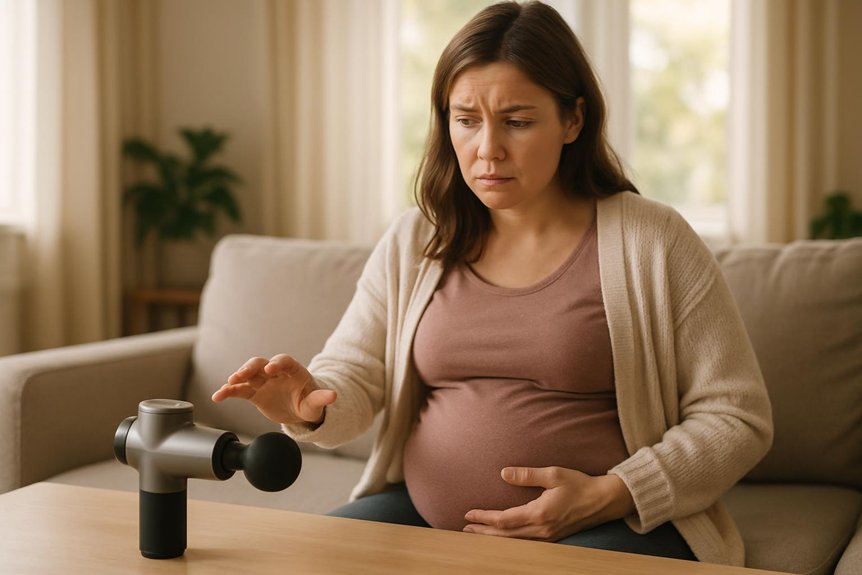
During pregnancy, increased sensitivity of tissues may lead to discomfort or adverse reactions when using massage guns.
There is also a concern that strong percussive techniques could potentially stimulate pressure points associated with uterine contractions.
At Spa & Massage, therapists emphasise safe, gentle manual techniques to minimise these risks and support maternal wellbeing.
Increased Sensitivity and Discomfort
Why do pregnant individuals often report heightened sensitivity and discomfort? During pregnancy, hormonal changes increase blood flow and alter connective tissues, leading to heightened skin and muscle sensitivity. This can make percussive devices like massage guns feel much more intense or uncomfortable than usual.
At Spa & Massage, therapists consistently observe that even gentle pressure can sometimes cause discomfort for expectant mothers, especially in areas where fluid retention or nerve sensitivity is common, such as the lower back and legs.
Using massage guns may unintentionally exacerbate tenderness or cause bruising. Our therapists recommend personalised, hands-on techniques that allow for real-time feedback and adjustment, helping clients feel safe and cared for.
Close communication ensures that any discomfort is addressed immediately, prioritising both relaxation and well-being throughout pregnancy.
Risk of Triggering Contractions
How significant is the risk of stimulating uterine contractions with external mechanical devices?
Evidence suggests that vigorous mechanical stimulation near the abdomen, lower back, or pelvic area could theoretically increase the risk of uterine contractions, especially in later stages of pregnancy.
At Spa & Massage, therapists are trained to avoid these sensitive areas during prenatal massage, using gentle, targeted techniques designed for safety and comfort.
While massage guns deliver rapid, percussive force, their use over or near the uterus is not advisable, as it may inadvertently stimulate uterine activity.
Clients are encouraged to consult their healthcare provider before using any mechanical device during pregnancy.
Our clinics prioritise techniques that nurture and relax, minimising risk while supporting the wellbeing of both mother and baby.
Safety Considerations for Different Pregnancy Stages
At each stage of pregnancy, specific physiological changes influence the safety and suitability of massage interventions, including the use of massage guns. During the first trimester, heightened sensitivity and increased risk of miscarriage require a cautious approach; gentle techniques are recommended.
In the second trimester, as circulation and fluid retention change, careful monitoring of pressure and duration is essential to avoid overstimulation.
By the third trimester, joint laxity and altered posture increase vulnerability to strain, so any percussive therapy must be adapted with expert consideration.
At Spa & Massage, therapists assess each client’s individual stage, tailoring guidance and support to optimise comfort and safety. This personalised attention ensures that both the expectant mother and her developing baby remain the central focus throughout any therapeutic intervention.
Areas to Avoid When Using Percussive Devices
Given the specific physiological changes during pregnancy, certain areas of the body require particular caution when considering the use of percussive devices such as massage guns.
Spa & Massage’s therapists advise avoiding direct use of these devices on the abdomen, lower back, and pelvic region, as these zones are especially sensitive and essential during pregnancy. The presence of increased blood flow and changes in tissue elasticity may heighten the risk of discomfort or harm.
Additionally, percussive therapy should never be applied near major blood vessels, such as those in the neck or inner thighs, due to the potential for circulatory complications.
In our clinics, special care is taken to protect maternal and fetal wellbeing, always prioritising gentle, hands-on techniques tailored to each individual’s comfort and safety.
Safer Alternatives for Prenatal Muscle Relief
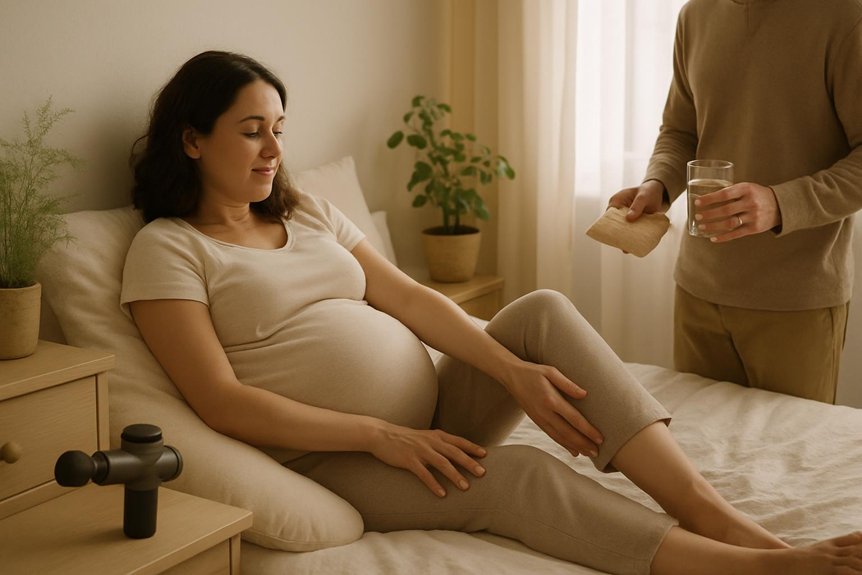
Due to the heightened sensitivity and unique physiological demands of pregnancy, Spa & Massage’s therapists recommend non-invasive, gentle approaches for managing muscle tension and discomfort.
Evidence supports the use of prenatal massage, which is specifically adapted to the needs of expectant mothers. This involves employing softer strokes and carefully considered positioning for ideal safety and comfort.
Warm compresses, gentle stretching exercises, and guided relaxation techniques can also offer significant relief without risk.
In Spa & Massage clinics, therapists may suggest the use of hypoallergenic oils and supportive bolsters to enhance relaxation and accommodate changing body contours.
These alternatives are designed to promote circulation, ease tension, and nurture both physical and emotional well-being.
Carefully tailored interventions ensure safety while offering the intimate, restorative touch that many pregnant clients seek.
How Our Therapists Support Pregnant Clients
How do experienced therapists guarantee a safe and effective experience for pregnant clients?
At Spa & Massage, therapists rely on clinical training and evidence-based techniques to assure the comfort and well-being of expectant mothers. Each session begins with a thorough consultation, allowing therapists to understand individual concerns and tailor treatments accordingly.
In these appointments, therapists use gentle, specialised prenatal massage techniques, carefully avoiding areas that may be sensitive or contraindicated during pregnancy. Positioning is adapted for maximum support and relaxation, often utilising cushions to accommodate changing body shapes.
Therapists also select pregnancy-safe oils, prioritising both soothing touch and safety. Continuous communication is encouraged, creating an intimate, reassuring environment where pregnant clients feel heard and nurtured throughout their wellness journey.
The Importance of Professional Guidance During Pregnancy
Why is professional guidance essential during pregnancy, especially when considering massage or wellness interventions? Pregnancy introduces unique physiological changes—such as altered circulation, ligament flexibility, and musculoskeletal dynamics—which require careful, tailored approaches.
Spa & Massage therapists understand that every expectant mother’s needs are distinct, and evidence supports the importance of adapting techniques for each trimester and individual circumstance. Professional assessment helps identify potential risks, such as contraindicated areas or techniques, ensuring both mother and baby remain safe throughout any intervention.
In our clinics, therapists utilise their expertise to monitor comfort, modify pressure, and choose suitable natural oils, always prioritising client wellbeing.
With professional support, expectant mothers can confidently navigate wellness options, receiving reassurance and guidance tailored to their personal journey. This expert care fosters trust, comfort, and peace of mind.
Tips for Safe Self-Care and Relaxation for Expectant Mothers
While pregnancy brings profound physical and emotional changes, safe self-care practices can substantially enhance comfort and wellbeing. Gentle movement, such as prenatal yoga or walking, promotes circulation and alleviates muscle tension.
Hydration and balanced nutrition are foundational for maternal and fetal health.
Relaxation techniques—including mindful breathing and meditation—support emotional balance.
At Spa & Massage, therapists recommend professional maternity massage tailored to each stage, using safe positioning and specialised oils to nurture both mother and baby.
Warm baths (not hot) and supportive pillows may ease discomfort at home.
Expectant mothers are advised to avoid vigorous pressure, unapproved devices, and essential oils not recommended for pregnancy.
Always consult a healthcare provider before introducing new therapies.
Personalised, evidence-based care remains the cornerstone of a healthy pregnancy journey.
Conclusion
For expectant mothers, the journey of pregnancy is like crossing a gentle, shifting landscape—every choice matters. While massage guns may promise quick relief, their percussive power can pose hidden risks. Guided by clinical expertise, Spa & Massage therapists recommend safer, evidence-based options tailored to each stage of pregnancy. With professional guidance, mothers-to-be can find comfort and safe relaxation, ensuring well-being for themselves and their growing child as they move steadily toward the horizon of motherhood.
